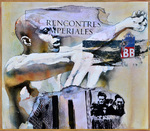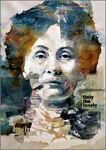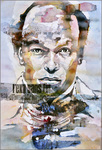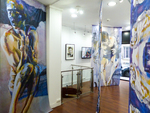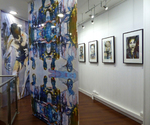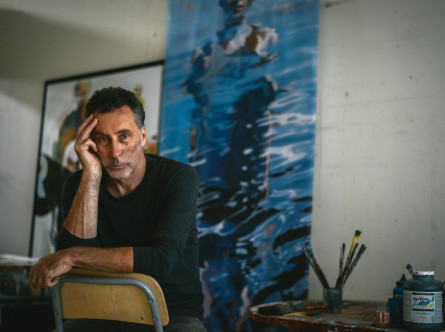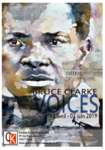BRUCE CLARKE
Artiste plasticien et photographe, Bruce Clarke est né en 1959 à Londres de parents sud-africains en exil du fait de leur activité politique
anti-apartheid. Après des études aux Beaux-Arts à l’Université de Leeds, il s’installe à Paris qui lui sert de base pour créer et réfléchir sur le monde.
Son oeuvre traite de l’histoire contemporaine, déconstruit les modes de pensée et les représentations de nos sociétés pour stimuler une réflexion sur
le monde actuel. Chez Bruce Clarke, le travail plastique est inséparable d’un militantisme politique. Figure importante du mouvement anti-Apartheid en France, Bruce devient dès son arrivée à Paris
l’un des principaux acteurs de la mobilisation de l’opinion publique française contre le régime de séparation raciale en Afrique du Sud. Au moment où Nelson Mandela accède au pouvoir en Afrique du
Sud, a lieu le génocide des Tutsi au Rwanda. Proche de la communauté rwan-daise vivant en Europe, Bruce Clarke part effectuer un reportage photographique quelques semaines après le génocide. A la
demande de rescapés du génocide, il entreprend dès 2000, sur le site d’un massacre proche de Kigali, « Le Jardin de la Mémoi-re», un mémorial en forme d’installation monumentale, soutenu par la
société civile, les institutions rwandaises et l’UNESCO.
Invité par le Conseil Général de Guadeloupe, il y réalise en 2002 l’exposition «Fragments d’une Histoire de Demain» sur les liens entre esclavage,
colonialisme et mondialisation.
En 2006, paraît son ouvrage “Dominations” aux éditions Homnisphères.
Sa démarche artistique Partant de fragments déchirés, de journaux, d’affiches, il lie mots et couleurs. Les mots et les images s’intègrent et se
recomposent sur la toile. Les éléments de collages sont pris comme entités uniques, individuelles, puis noyées, couvertes, enduites pour épaissir et opacifier le support avant de réapparaître
autrement, sous la forme d’un vaste palimpses-te. Sa démarche de plasticien est en soi un engagement, un commentaire critique sur le monde.
Visual artist and photographer Bruce Clarke was born in 1959 in London to South African parents in exile because of their anti-apartheid political activity. After
studying at the Beaux-Arts at the University of Leeds, he moved to Paris as a base for creating and reflecting on the world.
His work deals with contemporary history, deconstructs the ways of thinking and representations of our societies to stimulate a reflection on the world today. At
Bruce Clarke, plastic work is inseparable from political activism. An important figure in the anti-apartheid movement in France, Bruce, as soon as he arrived in Paris, became one of the main actors
in the mobilization of French public opinion against the regime of racial separation in South Africa. As Nelson Mandela comes to power in South Africa, the genocide of the Tutsi in Rwanda takes
place. Close to the Rwandan community living in Europe, Bruce Clarke is doing a photo report a few weeks after the genocide. At the request of survivors of the genocide, he began in 2000, on the site
of a massacre near Kigali, "The Garden of the Memo-re", a memorial in the form of a monumental installation, supported by civil society, the Rwandan institutions and UNESCO.
Invited by the General Council of Guadeloupe, he realized in 2002 the exhibition "Fragments of a History of Tomorrow" on the links between slavery, colonialism
and globalization.
In 2006, his book "Dominations" published by Homnisphères.
His artistic approach Starting from torn fragments, newspapers, posters, he binds words and colors. Words and images are integrated and recomposed on the canvas.
The elements of collages are taken as unique, individual entities, then drowned, covered, coated to thicken and opacify the support before reappearing otherwise, in the form of a vast palimpses-te.
His approach as a visual artist is in itself a commitment, a critical commentary on the world.


